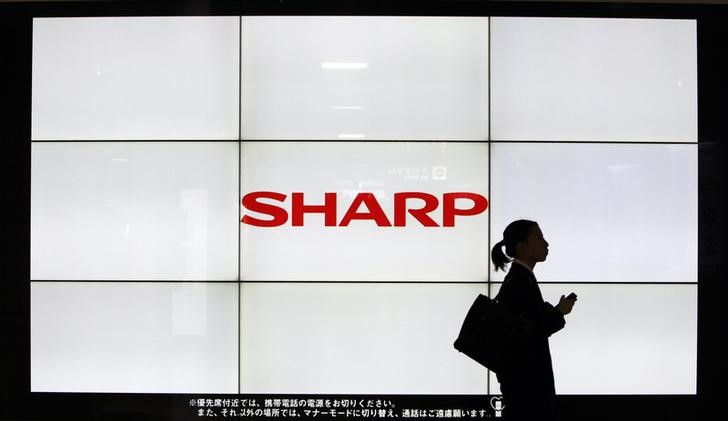By Taiga Uranaka and Ritsuko Ando
TOKYO (Reuters) - Loss-making Japanese electronics firm Sharp Corp meets its main banks on Thursday in an effort to secure its second major bailout since 2012, betting they will have little choice but to pay up despite their call for more drastic overhauls.
Sharp Chief Executive Kozo Takahashi will meet officials from Mizuho Bank and Bank of Tokyo-Mitsubishi UFJ, hoping to discuss further funding and buy time, people with direct knowledge of the matter said.
Sharp may consider an exit from solar panels and plant closures, but these would not be enough for the banks, which want Sharp to follow the more successful Panasonic Corp and Sony Corp with bolder moves, the sources said.
"There is no next time," said a senior executive at one of the banks. "I am giving instructions to our people that Sharp needs to make an unprecedented, bold plan."
But while the banks are loath to throw good money after bad, they are keen to avoid triggering a collapse of the globally known, 100-year-old maker of TVs and high-end panel displays.
The banks agreed in September 2012 to save Sharp with loans and credit lines worth 360 billion yen, or $3 billion (2 billion pounds) at today's exchange rates, in exchange for promises to return to the black by this year. Sharp exited the European TV market and closed solar-panel businesses in Europe and the United States.
The banks have had representatives on Sharp's board since the last bailout, so cannot claim to have been misled about its finances. The firm recently reversed a profit forecast for the year ending this month to a 30 billion yen loss, blaming weak sales of displays for smartphones and tablet computers.
Banks say a debt-for-equity swap - writing off their loans in return for ownership of Sharp - would be a logical option for any new rescue, one source said.
Japanese media on Tuesday put a new bailout at up to 200 billion yen, but bankers insist no amounts have been discussed and that any funding would be determined only after deciding what is needed to help Sharp take specific restructuring steps.
A Mizuho spokeswoman said nothing had been decided, with Sharp and the banks due to begin talks ahead of the company's expected release of its medium-term business plan in May.
Sharp and MUFG representatives declined comment.
Troubles at Osaka-based Sharp underline a decline in competitiveness for Japanese consumer tech firms, which have lost market share to the likes of Apple Inc (NASDAQ:AAPL) and Samsung Electronics Co Ltd, as well as more nimble Asian rivals.
Sharp gets most of its sales from LCD panels, TVs and cellphones. It could consider such steps as exiting the solar energy business and shutting some plants in its ailing electronic parts business, company sources said.
But executives are so far unwilling to take more radical options such as merging the display business with that of rival Japan Display Inc, or cutting more jobs, the company sources added.
Credit rating agency Standard & Poor's Corp on Tuesday slashed Sharp's rating deeper into "junk" territory to CCC+, with more downgrades likely. S&P said it expected the company's main banks to pump in more cash in what the ratings firm considered a "selective default".
Sharp and the banks thought things were on the mend until late last year, when a sudden drop in demand from Chinese smartphone makers hit profits.
As recently as November, the head of Sharp's device business, Norikazu Hohshi, said screen shipments were going strong as it expanded its client base in China to 15 smartphone makers from an earlier eight.
Sumitomo Mitsui Banking Corp, Japan's third-largest lender, also appeared optimistic as it announced a 10 billion yen loan, despite the lack of a prior relationship.
A major downdraft for Sharp has been an unexpected recovery by rival Japan Display Inc, which won business in the high-end display market late last year at Sharp's expense.
Japan Display reported a profit last month after two quarters of losses, boosted by demand from Apple and Chinese smartphone makers such as Xiaomi Technology Co (XTC.UL).
A weaker yen has worsened Sharp's outlook because its home appliances business imports much of its products from offshore factories.
"It's a shame," said one of Sharp's senior bankers. "But how could we have expected the yen's sharp fall and Japan Display's sharp improvement in competitiveness back then?"
Another reason the banks may again reach into their pockets is tradition.
"As long as a company has the possibility to survive, Japanese banks try to help," one of the bankers said, stressing he was speaking generally.

"That's different from U.S. banks. I know the criticism that this is how Japanese banks make zombie companies."